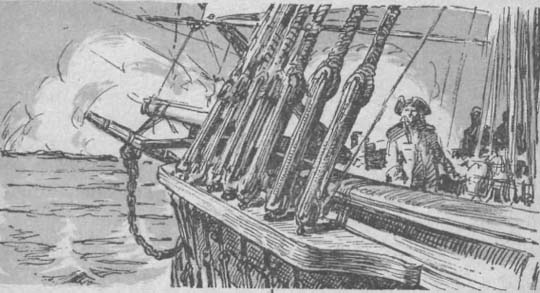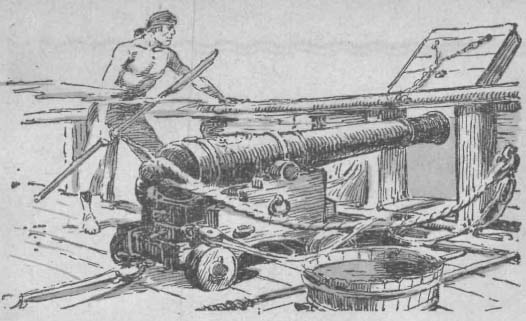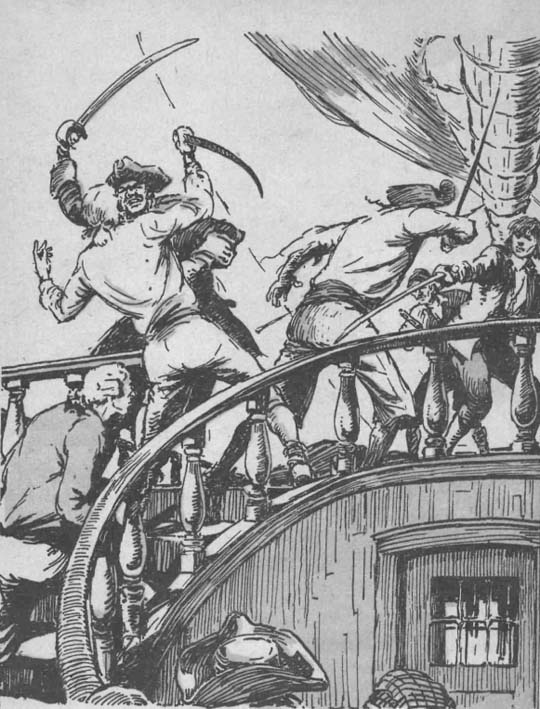Scarface (16 page)
Authors: Andre Norton
To Scarface’s mind the anchored brig had little about her to make her noteworthy, but if Cheap proclaimed her so it was doubtless true, since the Captain seldom erred in such judgments. But how they were to cut her out of the harbor he did not see. But that was Cheap’s problem also. And now he himself was more concerned with learning why the Captain thought that Bridgetown should be of special interest to him.
That is, that was his first preoccupation—until he chanced to glance above the deck and saw that the ship upon which he stood was flying boldly the crimson Jack of an honest merchant craft with below it the dreaded yellow square which signified a plague ship! So that was how they had been able to come into the island harborage without raising alarm! But—he flogged his memory—had not some such scheme been tried once before—sometime—somewhere? If he could only remember!
They had been sighted and now from shore a trim launch was putting out. It bore the Queen’s Jack and could be either a naval or a customs’ craft coming to warn them off the town lest they infect the island.
As he hung over the rail watching that smaller boat approach Scarface heard a scuffle below. Someone had endeavored to climb through one of the gun ports and had been jerked back out of sight, with only a shrill, cut-off cry to mark the failure of his attempt. So Cheap was holding a prisoner between decks, a prisoner who had tried to gain the attention of those aboard the launch. Well, prisoners
had been on Cheap’s ships before—but never for long. All Scarface hoped was that Creagh did not have the governance of this one—whoever the poor devil might be.
The launch came alongside but at a respectful distance. Scarface started to push forward to see its occupants, only Cheap’s hand closed talon-wise about the boy’s upper arm and he was held where he was. It was not the pirate captain who had gone down to answer the hail of the port authorities. Nathaniel Buck, rigged out in an ill-fitting red coat, stood there.
Buck! How did he come on this brig? He had not sailed from Tortuga with them—or had he? Since he, Scarface, could no longer trust his memory, how could he be sure of anything which had happened in the past? But why did Buck play the captain while Cheap stood in hiding?
One man dared to leap the gap between launch and ship and clamber up to them, a doctor’s bag slung around his neck, sent doubtless to verify their leperdom. When Buck greeted him he pressed a folded paper on the New Englander and then stood waiting.
Buck came aft as two men closed in on the doctor. At their words the small man from shore went rather reluctantly towards the crew’s quarters. Buck flipped the paper to Cheap.
“Greetings from His Excellency and a warm warning to take ourselves off, I suppose.” The New England captain waited for Cheap to finish reading. “I don’t like this—”
“Do you ever?” commented Cheap. “Hmm—” He scanned the few lines swiftly. “Ha, so Sir Robert would have us remove ourselves speedily to such a spot as he shall
designate. Shall I go ashore to throw myself on his mercy and beg for pity?”
His brother captain favored him with a glance which implied that he was indeed moon-struck and altogether witless.
“When he knows your face as well as he knows the back of his hand? This is a crazy plot, Cheap, and I would that I had not lent my ship to it. No good will come of such recklessness—I warn you.”
Cheap pointed to the other brig. “Look there and think what lies under her deck; that should change your tune quick enough. I’ll contrive an answer to this which will keep Scarlett off—until we are ready. He’ll wake too late and then he’ll discover that too late is never! I’ve had a rod in pickle for Robert Scarlett a good score of years!”


Chapter Sixteen
“UNTIL YOU ARE DEAD, DEAD, DEAD!”
MAYBE IT was the ill-omened presence of Black Quinby, maybe it was the good luck of Robert Scarlett, but fate, at long last came into striking distance of Jonathan Cheap that day, and the blow she dealt him was no light one. Scarface was never clear afterwards as to what started that debacle.
It began on board one of the sloops which had companied them into the anchorage. There were shouts from her deck and then the crackle of pistol shots. The peddlers' boats fled as if the plague lay naked there and someone lost his head and lobbed a shot after the tail of the nearest.
As a result the trumpet call to quarters was blown on the seaworn brig Cheap was watching and her gun ports opened. Her master was either a vastly suspicious or a vastly nervous man, and, in either case, his prompt action was to save him his ship, because Cheap, always reckless when it came to battle, took that as a challenge. Before Buck or Quittance could argue it he had given the nod to Creagh and those wolves who followed him.
Had Buck been aboard his own ship he might, have tried to run for it, for he was a prudent man and had no liking for such odds as faced them now. But he was on Cheap's ship and fight he mustâwhich might have been what Cheap intended from the beginning.
Having given the game away the sloop now proceeded to make bad matters doubly worse by firing with ragged persistence at the shore fortificationsâthe fact that all the balls fell yards short of their goal apparently making no impression upon the gunner at all. Witnessing this, the farthest bark of their small fleet frankly turned tail and started out to sea, deserting her company. Buck bit his nails as he watched her goâfor she was his own ship.
So did Jonathan Cheap's fine plan break into so many pieces and no man could save them now. What remained was a sorry business.
Cheap and Quinby fought, and Lechmere, on whose deck the betrayal had begun, hammered awayâmostly at thin air and empty water. There was a wild hour in which twice it seemed as if they might win free after all, but when the sloop of war, the brig and the forts all lapped them in with fire, that hope vanished. And the end was
bitter fighting across the decks where the smooth dull red paint could no longer hide the brighter patches of fresh crimson.
Scarface cut and thrust with a blade he had chanced upon, and by some luck or his own skill was among that handful who won up to the afterdeck and there stood panting back to back, waiting for the last rush of the island men. It was a dirty business and he was almost glad when the end came.
The commander of the invaders brought up a culverin and trained it upon them, ordering the pirates to throw down their arms or be blasted. Even Cheap could not face that and his sword rang with the others on the planking.
So did Scarface come into Bridgetown, his arms lashed behind him, thrust up the wharf's ladders to walk with his fellows down the crooked lanes toward the jail with the soft oaths of Cheap overriding in his ears the shouts and taunts of the crowd which ringed them in.
He found himself at last in a dark cellar where various stenches warred and the floor was slimy underfoot. And he was not alone, but shared these quarters with what was left of the ship's crews. So there was little room indeed and if a man found a spot wherein he might squat upon his hunkers he was lucky. In the gloom it was hard to tell one powder-blackened face from another, but he noted that Cheap and the other officers were not with them. Here was only the common sort and most of them had already abandoned hope since Sir Robert's temper toward pirates was well known throughout the Main. Only some who were pressed men or unknown spoke among themselves of pardons.

Scarface cut and thrust with a blade he had chanced upon.
How long they were imprisoned there he had no way of telling and in the after days he believed that his fever must have come upon him again for he could remember so little of that time, save that once he ate hungrily of coarse mealie dumplings, such fare as slaves fed upon. And when at last the crew were brought forth, the open light of day hurt his eyes, so that he would have shielded themâhad his hands not been seized and bound behind him again.
The prisoners were led into court in companies of ten and when he stood with some others from his cell he found that Cheap and Buck were also to be of their number. The New Englander stood with bitten lip and eyes which roved the room as if he needs must free himself or perishâas was indeed trueâsave that there was little hope of freedom.
But Cheap, in spite of the heavy irons at his wrists and the slave bar at his ankles which held him to a short shuffle instead of his usual free stride, held his head high and stared back at the islanders assembled there as if he were as great a man as he who sat in the governor's high seat. Indeed there was the same sort of air about them both, as if they had long walked in companies where other men did their bidding without question. And now their eyes held long together and it seemed that this was not a trial but a silent duel between the two of them.
Scarface shook his head at these crackbrained fancies. But this room, the fellow pressed against him, Cheap and the other man who must be Sir Robert trying to outstare each otherâthese all were unreal, as if he were in the midst of one of those muddled dreams which torment the
uneasy sleeper. He pulled himself together and resolved to plead not guilty and hope because of his youth to be given a chance at pardon.
Only the heat and crowding of the room made his head ache most vilely and sometimes when those about him spoke he could not hear what they said but only saw their lips move in their faces. Now some official of the court was reading out their names.
“Jonathan Cheap, Captain, Nathaniel Buck, Captain, Nathaniel Creagh, Boatswain, John Dipper, Eleazer Camberwell, Rance Spranger, Phineas Burch, Richard Stodgill, Dennis Broome, Justin Bladeâ”
Ten names, and ten men stood in the dock. But they had not read his name. What did that mean? There had been no “Scarface” on that list.
“Broome and Stodgill do plead that they are forced men,” went on the clerk, “and do throw themselves upon the court's mercy. Justin Blade has taken the Queen's Pardon and then returned again to his evil waysâ”
Scarface wondered which of their number was that unlucky wretch who would now have no chance at all. Three of the men standing with him were strangers from one of the other ships; it might be any one of them. Only why hadn't they called his name?
It was a lengthy business, this trying of pirates, for each man must have his chance and there were many witnesses to be called. They tried the common men first, leaving the officers until the end. Dipper and Camberwell made only a poor showing and when they would speak in their own defense they but yammered for mercy. Stodgill was
able to prove that he had been indeed a forced man, kept from a captured ship because he was a skilled carpenter. But why had they not yet spoken of Scarface?
At last only he, Creagh and the two captains were left. And then the Queen's Counsel addressed the Judge with such words as left the boy staring down at him in horrified amazement.
“M'lord, we come now to one of the greatest villains this island has ever seen. This youth, in spite of his few years, has accomplished such evil as few twice his age do. He did take the Queen's Pardon, and nourished by those he was able to hide his foul heart from, he did live here among usâwhilst all the time he was acting as a spy for this Jonathan Cheap. And all this can we prove. M'lord, I do now call Major Humphrey Cocklyn!”
A tall man in the red coat of an officer came forward to swear the oath while Scarface watched him unbelievingly. This couldn't be trueâhe wasn't Justin Bladeâhe had never been in Bridgetown beforeâor had he? What was the past Peter's concoction had driven from him?
And, as the man testifying against him spoke, the boy leaned forward listening eagerly to every word. It was a most fantastic tale. That he had been brought ashore from the
Naughty Lass,
that he had lived for weeks under Cocklyn's roof, that he had then been taken to the palace to supply the governor with information concerning Tortugaâ
“And this Justin Blade while under your roof did accept the Queen's Pardon?” prompted the prosecutor.
For the first time Cocklyn glanced up at the boy. In his
brown face his eyes were hard, his mouth a thin line of distaste.
“Aye, sir.”
“And you did thereafter care for and maintain him almost as a son within your household?”
Cocklyn bowed his head in assent. The Queen's Counsel, smiled cheerfully.
“And how did he afterwards requite you for this hospitality?”
“He was to act in some measure as a companion to my young nephew, Sir Francis Hynde. And he did betray this trust when he returned to his friends, taking Francis with him so
that the lad might be held for ransom.”
“So. A vile fellow indeed, Major Cocklyn. M'lord, if it be your pleasure, we will now call upon Sir Francis to tell the court how this pirate used him.”
Cocklyn stepped down and another took his place. Scarface frowned. That bewigged and satin-coated little fopâSurely he had never seen him before!
“Sir Francis,” said the counsel, “be good enough to raise your eyes to the dock and tell the court if you have ever seen before any of the men now standing therein.”
Eagerly the boy scanned the row of prisoners.
“Oh, aye,” he cried. “There is Captain Cheap, and Nat Creagh and Scarfaceâ”
“And who is Scarface?”
“JustinâJustin Blade, but the pirates do call him âScarface.' Captain Cheap said that he served them well as eyes within Bridgetown.”
There was a stir in the room and even the Judge frowned.
For a moment Sir Robert even lost interest in Cheap and transferred his attention to Scarface.
“M'lord, with the permission of the court Sir Francis will tell his story in its entirety.”
So did they all hear of a day's fishing and what it led to. Scarface swallowed with a dry throat. This web they were spinning about him had no escape hole. Surely they couldn't all be mistakenâhe must have done these thingsâbeen here beforeâknown these peopleâOnly he could not remember!
“Wait!” That word of interruption had come from the Governor himself and now he spoke to the Judge. “M'lord, if it please the court, may I ask the witness a question?”
If the Judge was annoyed he masked that emotion and agreed quickly enough to His Excellency's request.
“So when you were aboard this ship Blade did suggest to you that you might escape when you sailed again to Bridgetown?”
“Aye, Your Excellency. But he also said that he would help me. And then he lied, for when I came and asked it of him he did not move or answer me.”
“Why not?”
“I know not, Your Excellency, save that Captain Cheap did say that he had the coast fever and then he and the great black manâhim whom they call Ghost Peterâtook Scarface away and I did not see him again. They said that I must not trouble him for he was illâ”
“Very interesting,” commented Sir Robert. “May we ask”âhe spoke now to the counselâ"to hear evidence concerning the demeanor of the prisoner during the fighting?”
The counsel had plenty of such testimony to offer. Scarfaceâthe bloodthirsty Bladeâhad fought well and had only been taken by that last threat of the culverin.
“Then at no time did the prisoner offer to join those attacking the pirates?” persisted Sir Robert.
Again a murmur swept the court. But the lieutenant who had come to the stand was quick to reply.
“At no time, Your Excellency. He fought most savagely and seemed to be in high favor with his fellows.”
“I see.” Sir Robert settled back in his chair as if he had lost all interest in the proceedings and the counsel seemed more sprightlyâas if a threatened danger had been safely by-passed. But he began almost at once to sum up his case against Justin Blade, laying great stress upon the fact that having once taken the Queen's Pardon the villain had returned to his old ways, that he was reported by Cheap himself to have been his spy within the town and that Sir Francis had seen him accept payment for that latter service.